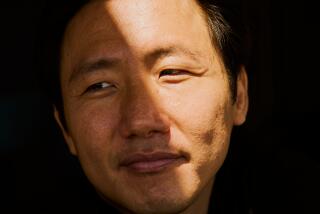Jane Barbe, 74; Queen of Phone Recordings Was Heard 40 Million Times a Day in 1980s
Jane Barbe, whose voice was familiar to millions of telephone users across the country who ever dialed a wrong number or had to âPlease listen to the following optionsâ in a voicemail system, died July 18 in Roswell, Ga., of complications from cancer. She was 74.
Barbe was the queen of telephone recordings, whose friendly but authoritative voice was heard an estimated 40 million times a day in the 1980s and early 1990s in everything from automated time and weather messages to hotel wake-up calls.
During her unusual 40-year career, she articulated such immortal lines as âAt the tone, the time will be 7:22 and 40 seconds,â âIâm sorry, the number you have dialed is no longer in service,â and âPlease press 1 for more options.â
Her voice seemed to be everywhere, but especially, as Ted Koppel once noted on a segment of âNightlineâ devoted to the topic, in âvoicemail jail.â
She was not the only person who recorded voicemail and other automated phone messages, but she perhaps did so longer than anyone else.
âI think she was probably one of the first,â said Pat Fleet, who has been in the telephone voice recording business for 25 years and is known as the AT&T; Lady for her work for the telecommunications giant.
Barbe did most of her recordings for Atlanta-based Electronic Telecommunications Inc., which at one time produced as many as 2,000 voice messaging systems for businesses and government agencies, and for Octel Communications, which is now a part of Bell Labs/Lucent.
In the 1980s and â90s, Barbe was the voice on 1,000 of Electronic Telecommunicationsâ systems, according to recording services manager Michael Miller.
She was heard on 90% of âintercept messagesâ -- the recording played when something is wrong with a phone number -- and 60% of automated time and temperature calling programs.
âYou hear my voice in more than 1,000 cities in the United States, Saudi Arabia, Hong Kong, South America, Canada.... Vocally, I get around,â she told the Chicago Sun-Times some years ago.
She was often flabbergasted at her fame -- or notoriety. People wrote her letters, some saying they called a certain number to hear her voice when they were lonely. When she appeared at business conventions, sometimes hundreds of people would line up for her autograph.
A Florida native who grew up in Atlanta, Barbe studied drama at the University of Georgia. There she learned how to remove the Southern inflections from her voice. âYou havenât lived until youâve heard âAntigoneâ in a Southern accent,â she once quipped.
That training proved invaluable in 1963 when she began working for Audichron, the unit of Electronic Telecommunications that pioneered the time-weather telephone message industry. She had to deliver her lines in clear, measured tones, without any regional accent.
But over the years, her services were requested with accents, such as the time an Australian phone company asked her to put on an Australian accent to record time and temperature messages.
âThey looked all over downtown Sydney and couldnât find anyone to do it. So they hired my wife,â said Barbeâs husband, John, a musician and composer of advertising jingles.
Barbe is also survived by a daughter, Susan Stubin of Passaic, N.J.; a son, David, of Athens, Ga.; and seven grandchildren.
The Barbes met when she was hired as a vocalist for the Buddy Morrow Orchestra; John was the bandâs music arranger. After they married and moved to Atlanta, she worked in advertising, first as a copywriter and later as an actress. She did voice work for Fortune 500 companies such as Coca-Cola and Delta Airlines and acted in television commercials for Shake ân Bake and Crisco oil.
Her most enduring, and challenging, work was in telephone recordings, however. Not only did it require a voice that was clear and easy to listen to, but an ability to tailor her speech by mere tenths of a second.
The work could be tedious. She sometimes recorded 1,000 sound bites at a time. Those bites might break down a sentence like âYour message was sent on May 7 at 11:22 a.m.â into seven parts, and she had to learn to say a number like âsevenâ as quickly as she said âtwoâ in order to complete the message in the predetermined time.
âShe could handle that very well, and you could still understand what she said,â Miller said. Her talent, he added, was that âshe came across as so personable -- it was like she was talking to you.â
Knowing that many people think all telephone message systems use computer-generated voices, she tried hard to sound, well, human.
âWhen Iâm recording,â she told a Canadian journalist several years ago, âI really try to think of one person that Iâm talking to, because I would like it to sound one on one. I donât want to come across like a machine, if I can possibly help it.â
She got her own voice on the line on occasion, an experience she recalled as âreally weird.â
One time she overheard her mother dialing a number and getting her on a recorded message.
âShe said, âOh, shut up, Jane!â â before slamming down the receiver in exasperation.
More to Read
Sign up for Essential California
The most important California stories and recommendations in your inbox every morning.
You may occasionally receive promotional content from the Los Angeles Times.











